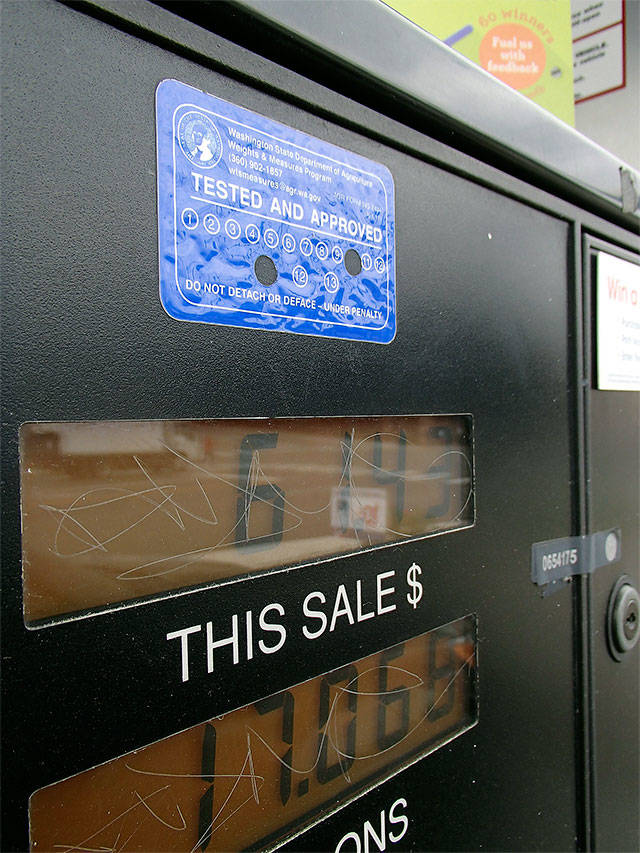Chuck Newcombe, of Everett, recently filled up his vehicle at a Chevron station in Everett.
“It’s a regular stop for me,” he said. “I’ve noticed recently that at least a couple of the pumps register up to 0.3 gallons before I detect fuel flowing through the hose.”
Was he being shorted?
Gas pump inspections are handled by the state Department of Agriculture’s Weights and Measures Program. We found their complaint line, and Newcombe sent in his observations.
Within two days, an inspector called him and followed up with a visit to the station.
“It passed her tests with no problem,” Newcombe said. “She went on to explain that there was fuel retained in the hose from the last use. The pump brings fuel from the tank to the other end of the hose before fuel begins moving out — what I felt as the delayed start.”
It was a speedy response for a state official.
“Guess there’s not a story here for you, except that of a satisfied taxpayer,” he said.
Well now, hold on, Chuck.
There’s always more to the story.
Fewer inspections, more problems?
There are worries that complaints could become more frequent. That’s because the state’s routine inspections of gas pumps are becoming increasingly rare, something our dear reader noted as well.
Just take a look at a state inspection sticker the next time you fill up.
Weights and Measures staff used to conduct a routine inspection of every gas station in the state at least every 26 months, program manager Jerry Buendel said.
The ideal inspection cycle is 18 months for compliance, Buendel said.
But now? The state is on track to inspect gas stations once every three years.
And a review by The Daily Herald of a handful of Everett gas pumps shows the actual visits can stretch even further. Of the six gas stations we checked, three had not had visits since at least 2015. That’s as far back as the agency looked; until 2016, the agency kept paper records. The stickers indicate the last inspection, in one case, could have been in 2011.
It’s a budget issue, Buendel said. The $1.39 million inspection program is run by fees, which haven’t increased since July 2007. A staff of 14 inspectors is now down to 11. All three of those lost posts were in the northwest part of the state.
It’s also a workload issue. The agency inspects lots of scales and weighing devices, not just gas pumps.
A bill that would have increased the annual registration fees — on such items as railroad track scales and cordage meters (which measure ropes) — did not make it out of committee last legislative session. Staff are trying again. Fees now range from $10 to $800. Proposed increases average nearly 54 percent.
Targeting problems
In the meantime, consumers can help inspectors target potential problems at the pump.
Possible warning signs:
The meter jumps when you initiate a transaction.
The meter keeps going when you’ve stopped a transaction.
Math doesn’t add up on your bill.
The wrong price is charged.
Inspectors also look for credit card skimmers and mechanical issues, such as an automatic shutoff failure.
In general, go with your gut, Buendel said. “Kind of the same way you size up a restaurant. You walk in and your instincts are going to tell you good or not good,” he said.
Often it turns out to be a non-issue.
A common complaint is a pump display showing more gas dispensed than a vehicle owner’s manual would indicate can fit.
“What your owner’s manual will show you is the minimum capacity for your fuel tank,” Buendel explained. “Depending on how your car is parked or other factors you can get more fuel in …
“But we still want to follow up on those, because there are times we do find problems,” he added.
Weights and Measures gets an average of about one complaint per day, most about gas.
More than eight times in 10, inspectors investigate a complaint within seven days, and often are on site by the next day, he said.
If they find a problem, they could issue a stop-use order until the pump is repaired, something that happens about 9.5 percent of the time. If it’s a less worrisome issue, like a burned-out light, they can issue a notice of correction, requiring repairs within 30 days.
One more thing …
We’re talking about gas.
So why are inspections handled by the Washington State Department of Agriculture, whose areas of law-abiding interest include apple maggots, cattle diseases and organically grown marijuana?
Weights and Measures programs have been around longer than gas pumps. The program was an independent agency when it began in Washington in the 1860s, Buendel said. It eventually merged with the Agriculture department. When gas pumps were added to the list of weighing devices needing oversight, they were brought into the fold.
That history is shared by the vast majority of states.
Besides gas pumps, inspectors check the scales a grocery store clerk uses to weigh your steak or the meter that dispenses the propane for your backyard barbecue. Taxi meters and fabric meters, too.
“If it’s sold by weight — even scales in candy stores and coffee shops — we test those to make sure people get their money’s worth,” Buendel said.
And businesses, too.
Sometimes inspections turn up the opposite problem; that is, a device is underweighing material and costing a company some profit.
“We see ourselves mostly as consumer protection. But at the same time we also serve the businesses,” Buendel said.
Spot a problem?
To file a complaint about a faulty gas pump:
Phone: 360-902-1857
Email: wtsmeasures@agr.wa.gov (write “Fuel Complaints” in the subject line)
Talk to us
> Give us your news tips.
> Send us a letter to the editor.
> More Herald contact information.


























